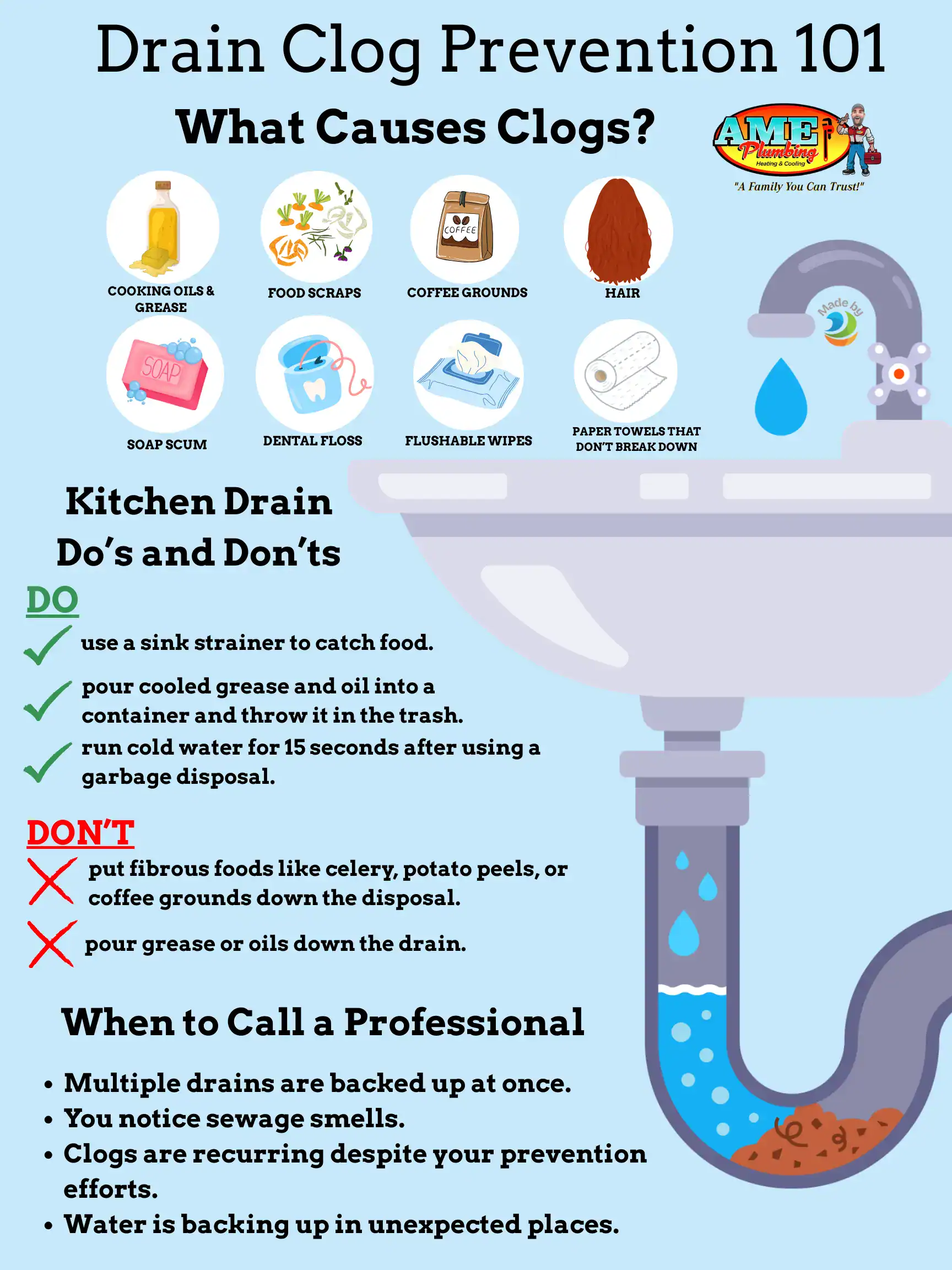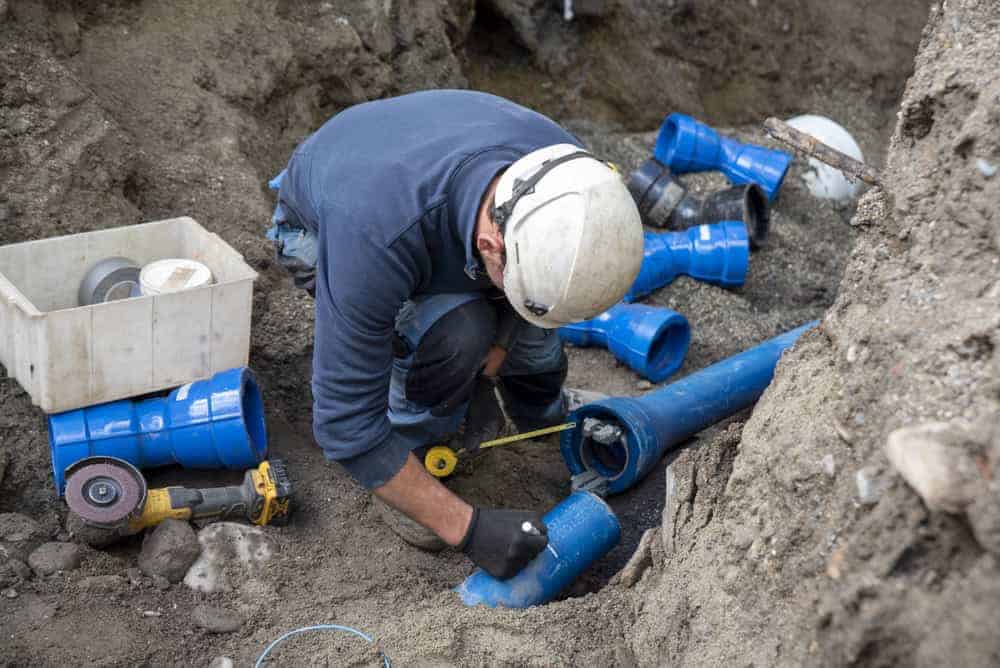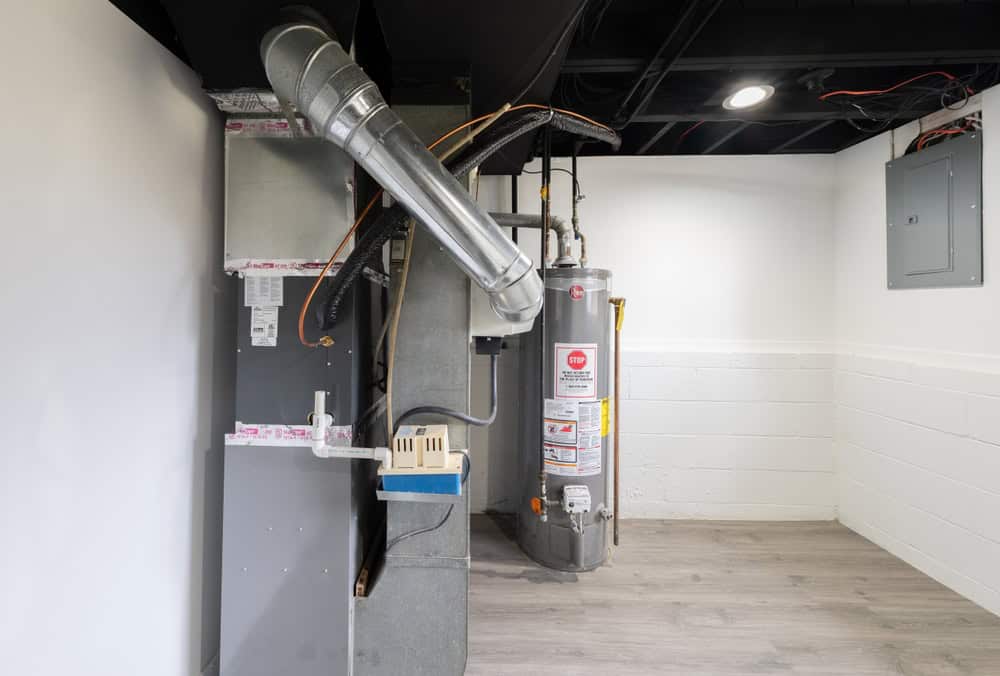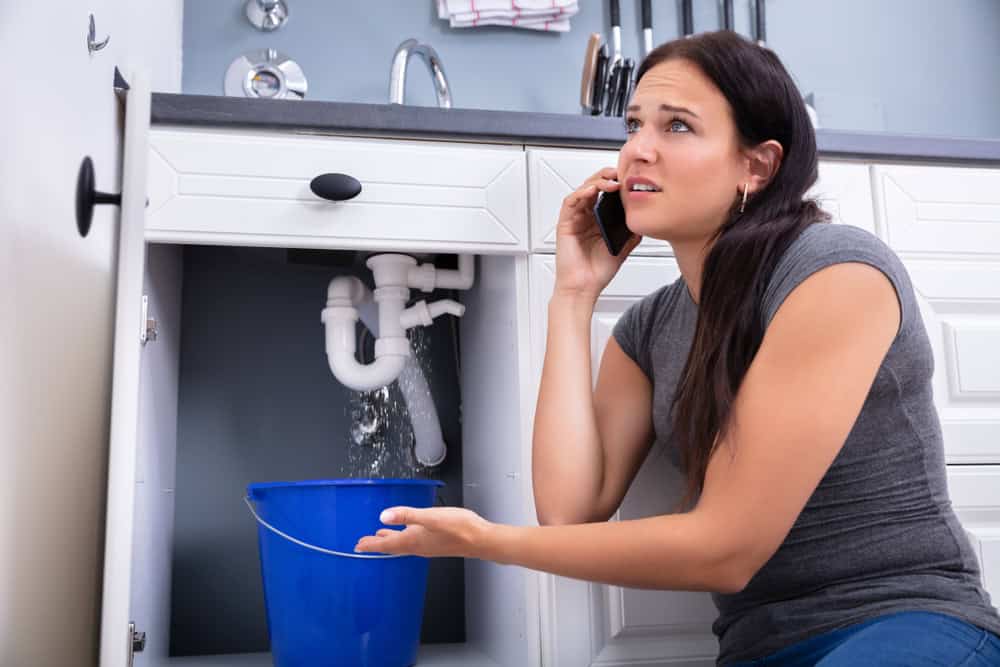Summary:
What Really Causes Your Drains to Clog
Before you can prevent clogs, you need to understand what creates them in the first place. Most people think drain clogs happen suddenly, but they’re actually the result of gradual buildup over weeks or months.
In your kitchen, the biggest culprit is grease and food particles. Even small amounts of cooking oil that seem harmless when they’re warm can solidify in your pipes and trap other debris. Hair dominates bathroom drain problems, especially when it combines with soap residue to form stubborn blockages that require professional drain cleaning.
What many Monmouth County homeowners don’t realize is that everyday items like coffee grounds, dental floss, and even “flushable” wipes can create serious problems requiring sewer line repair. These materials don’t break down like toilet paper, and they catch on pipe joints or existing buildup to create major blockages.

Kitchen Drain Protection That Actually Works
Your kitchen sink handles everything from morning coffee prep to late-night dish washing. This constant use makes it particularly vulnerable to clogs, but smart habits can keep things flowing smoothly without needing a plumber.
The golden rule is simple: never pour grease, oil, or fat down your drain. Even if you chase it with hot water, these substances will eventually cool and solidify somewhere in your pipes. Instead, let grease cool in a container and toss it in the trash. Your future self will thank you when you’re not dealing with a backed-up sink during your next dinner party.
Use a sink strainer to catch food particles before they enter your drain. These inexpensive mesh screens are your first line of defense against clogs. Clean them after each use, and you’ll be amazed at how much debris you’re keeping out of your pipes. When you use your garbage disposal, run cold water before, during, and for about 15 seconds after grinding food. Cold water keeps grease solid so it can be chopped up and flushed away rather than coating your pipes.
Skip putting fibrous vegetables like celery, potato peels, coffee grounds, and eggshells down your disposal. These materials can wrap around the blades or form a paste that’s nearly impossible to flush through your system. Once a week, pour a kettle of hot water down your kitchen drain to dissolve any grease buildup that might be forming. This simple step prevents the gradual accumulation that leads to expensive plumbing contractor calls.
Bathroom Drain Maintenance Made Simple
Your kitchen sink handles everything from morning coffee prep to late-night dish washing. This constant use makes it particularly vulnerable to clogs, but smart habits can keep things flowing smoothly without needing a plumber.
The golden rule is simple: never pour grease, oil, or fat down your drain. Even if you chase it with hot water, these substances will eventually cool and solidify somewhere in your pipes. Instead, let grease cool in a container and toss it in the trash. Your future self will thank you when you’re not dealing with a backed-up sink during your next dinner party.
Use a sink strainer to catch food particles before they enter your drain. These inexpensive mesh screens are your first line of defense against clogs. Clean them after each use, and you’ll be amazed at how much debris you’re keeping out of your pipes. When you use your garbage disposal, run cold water before, during, and for about 15 seconds after grinding food. Cold water keeps grease solid so it can be chopped up and flushed away rather than coating your pipes.
Skip putting fibrous vegetables like celery, potato peels, coffee grounds, and eggshells down your disposal. These materials can wrap around the blades or form a paste that’s nearly impossible to flush through your system. Once a week, pour a kettle of hot water down your kitchen drain to dissolve any grease buildup that might be forming. This simple step prevents the gradual accumulation that leads to expensive plumbing contractor calls.
Natural Cleaning Methods That Outperform Harsh Chemicals
You don’t need harsh chemicals to keep your drains clean. Many commercial drain cleaners can damage your pipes over time, especially with regular use. Natural cleaning methods are safer for your plumbing and just as effective for prevention.
The baking soda and vinegar method works for good reason. Pour half a cup of baking soda down the drain, followed by half a cup of white vinegar. The fizzing reaction breaks down buildup and deodorizes your drains. Let it sit for 15 minutes, then flush with hot water.
Hot water flushes work wonders for maintenance. Once a week, slowly pour a kettle of very hot (not boiling) water down each drain. This dissolves soap residue and flushes away debris that might be starting to accumulate, preventing the need for emergency drain cleaning services.
The Dish Soap Secret We Recommend
Here’s a trick that we and other experienced plumbing contractors recommend: regular dish soap treatments. This method is particularly effective for preventing grease buildup in kitchen drains, but it works well for bathroom drains too.
Pour a few tablespoons of dish soap down your drain and let it sit for several minutes. Dish soap is specifically designed to cut through grease and oils, making it perfect for breaking down the buildup that leads to clogs. After the soap has time to work, flush the drain with hot water.
This method is especially useful if you’ve accidentally let some grease go down your drain. The sooner you treat it with dish soap, the less likely it is to cause problems that require professional intervention. Dawn dish soap is particularly effective because of its grease-cutting power, but any quality dish soap will work.
For maintenance, try this treatment once a month in kitchen drains and every other month in bathroom drains. It’s gentle enough for regular use but effective enough to prevent most buildup from becoming a problem. The best part? You probably already have everything you need in your kitchen, saving you from expensive emergency plumber calls.
When to Call Us vs. DIY Solutions
While prevention is always the best approach, it’s important to know when a problem requires professional expertise. Some situations can become worse or cause expensive damage if you try to handle them yourself.
Call us immediately if multiple drains are backing up simultaneously. This usually indicates a problem with your main sewer line, which requires specialized equipment and expertise for proper sewer line repair or sewer line replacement. Similarly, if you notice sewage odors coming from your drains or water backing up in unexpected places, these are signs of serious issues needing immediate professional attention.
Recurring clogs are another red flag. If the same drain keeps clogging despite your prevention efforts, there’s likely an underlying problem requiring professional diagnosis. This could be anything from tree roots in your sewer line to a partially collapsed pipe creating a persistent bottleneck that needs hydro jetting or other advanced techniques.
For minor clogs that do develop, start with gentle methods like plunging or the baking soda and vinegar treatment. Avoid chemical drain cleaners, especially if you have older pipes or have recently used other chemicals. If these gentle methods don’t work after a couple attempts, it’s time to call professionals.
Remember that some problems, like main sewer line issues or problems with your home’s plumbing vents, aren’t something homeowners should attempt to fix themselves. We have the tools and training to diagnose these issues safely and effectively, often saving you money in the long run by preventing more extensive damage to your Monmouth County home.
Protecting Your Monmouth County Home's Plumbing Investment
Preventing drain clogs isn’t just about convenience – it’s about protecting one of your home’s most important systems. With median home values in Monmouth County continuing to rise, maintaining your plumbing system is a smart investment in your property’s value and your family’s comfort.
The steps we’ve covered are simple but effective: use strainers, avoid pouring grease down drains, clean stoppers regularly, and treat your drains with natural cleaning methods. These habits take just minutes but can save you hundreds or thousands in emergency repairs and sewer line replacement costs.
Remember that prevention is always easier and less expensive than dealing with major clogs or pipe damage. When you do encounter problems beyond simple prevention, don’t hesitate to reach out to us at AME Plumbing Heating and Cooling for professional assistance. Taking care of small issues now prevents them from becoming big, expensive problems that disrupt your daily life and drain your wallet.






